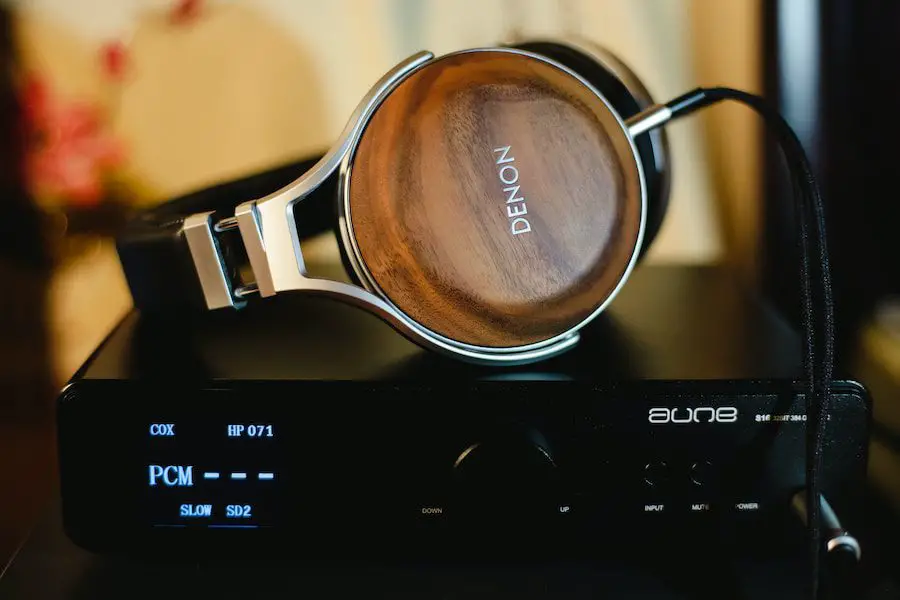Digital-to-analog converters (DACs) have become increasingly popular in recent years, with many audiophiles and music lovers investing in high-quality DACs to enhance their listening experience. But are DACs worth the investment? As with many things, the answer is that it depends on various factors.
For those who primarily listen to music on their smartphones or laptops, a DAC may not be necessary. Most modern smartphones and laptops have built-in DACs that are more than sufficient for casual listening. However, for those serious about their music’s quality, a high-quality DAC can make a significant difference. A good DAC can improve music’s clarity, detail, and overall sound quality, particularly for those who listen to high-resolution audio files.
It’s also worth considering whether a headphone amp in addition to a DAC is necessary. While a DAC can improve the audio signal quality, a headphone amp can provide additional power and control to the headphones, resulting in a more dynamic and detailed sound. Whether a DAC is worth the investment depends on the individual’s listening habits, equipment, and budget.
Table of Contents

What are DACs?
A Digital-to-Analog Converter (DAC) is an electronic device that will convert a digital audio signal to an analog signal capable of being played through speakers or headphones. It is an essential component of an audio system that plays digital music, including computers, smartphones, and portable music players.
DACs in Detail
DACs are designed to convert digital audio signals into analog signals that speakers or headphones can play. They work by taking a digital signal, such as a music file, and converting it into an analog signal that can be played back through speakers or headphones. This process involves several components, including the DAC chip, clock, and amplifier.
DAC Components
The DAC chip is the heart of the DAC and is responsible for converting the digital signal into an analog signal. The clock synchronizes the conversion process and ensures that the analog signal is accurate and noise-free. The amplifier boosts the analog signal to a level that can be played back through speakers or headphones.
DACs can be built into audio components such as CD players, amplifiers, and receivers, or they can be standalone devices that connect to a computer or portable music player. USB DACs are a popular type of standalone DAC that connects to a computer via USB and is used to play high-quality audio files.
High-quality DACs are essential for audiophiles who demand the best sound quality from their audio systems. They are designed to convert digital audio signals into analog signals with the highest possible level of detail and accuracy, resulting in a sound as close to the original recording.
Overall, DACs are essential to any audio system that plays digital music. They are responsible for converting some digital audio into an analog signal that can be played through speakers or headphones. High-quality DACs are essential for audiophiles who demand the best sound quality from their audio systems.
Why Use a DAC?
DAC vs Built-in DAC
One of the primary reasons to use a separate DAC is to improve the sound quality of your digital music. While many devices have built-in DACs, they are often lower quality than a dedicated external DAC. This is especially true for portable devices like smartphones and laptops, which prioritize portability and battery life over audio quality. A dedicated DAC can provide a cleaner, more accurate sound with better dynamic range and less distortion.
DACs and Sound Quality
Another advantage of using a DAC is that it can improve the sound quality of your headphones. A good DAC can provide a clearer, more detailed sound with better separation between instruments and vocals. This is especially true for high-impedance headphones, which require more power to drive than most built-in headphone amplifiers can provide. A dedicated headphone amplifier and DAC can provide the necessary amplification to drive these headphones to their full potential.
DACs and Headphones
When using a DAC with headphones, it’s important to consider the impedance of your headphones. Higher-impedance headphones require more power to drive and may benefit from a more powerful headphone amplifier. Additionally, some DACs have a built-in headphone amplifier that may not be powerful enough to drive high-impedance headphones. Choosing a DAC and headphone amplifier compatible with your headphones is important to ensure the best possible sound quality.
In summary, using a DAC can significantly improve sound quality over built-in DACs found in most devices. In addition to providing cleaner, more accurate sound, a dedicated DAC can improve the sound quality of high-impedance headphones. When choosing a DAC, it’s important to consider the impedance of your headphones and choose a DAC and headphone amplifier compatible with them.
Types of DACs
External DACs
External DACs are designed to be used with a computer or other digital audio source. They are standalone devices connecting to the computer via USB, coaxial, or optical cables. External DACs are often considered the best option for audiophiles who want the highest-quality audio possible. They are also a good choice for people who have high-end headphones or speakers and want to get the most out of them.
Standalone DACs
Standalone DACs are similar to external DACs but are designed to be used with other audio equipment, such as CD players or amplifiers. They often have more inputs and outputs than external DACs, making them more versatile. Standalone DACs are a good choice for people with a lot of audio equipment and who want to ensure that everything is compatible.
Portable DACs
Portable DACs are designed for mobile devices, such as smartphones or tablets. They are often small and lightweight, making them easy to carry around. Portable DACs are a good choice for people who want to improve the audio quality of their mobile devices without carrying around a lot of extra equipment.
Dongle DACs
Dongle DACs are small devices that plug directly into the USB port of a computer or mobile device. They are often the most affordable type of DAC, but they may not offer the same level of audio quality as other types of DACs. Dongle DACs are a good choice for people who want to improve the audio quality of their computer or mobile device without spending much money.
In general, DACs are a good choice for people who want to improve the audio quality of their digital audio sources. They are especially useful for people who listen to 24-bit or lossless audio, which can be difficult to play back without a high-quality DAC. Asynchronous DACs are also a good choice for people who want to minimize jitter and other timing errors that can degrade audio quality.
Best DACs
When it comes to choosing the best DAC, there are a lot of factors to consider. The most important things to consider include sound quality, connectivity, and portability. Below are some of the best DACs currently available on the market.
Best Overall DACs
There are a few options for those looking for the best overall DAC. The Chord Hugo 2 is popular, known for its balanced sound and built-in battery. The Mytek Brooklyn DAC+ is another great option, offering direct stream digital (DSD), MQA decoding, and excellent clocking.
Best USB DACs
For those looking for a DAC that connects via USB, the AudioQuest DragonFly Cobalt is a great choice. It offers excellent sound quality and is highly portable. The iFi Zen DAC is another great option, offering a balanced sound and support for high-resolution audio formats like Apple Lossless Audio Codec (ALAC).
Most Portable DACs
For those who need a DAC that is highly portable, the Shanling UA1 is a great option. It is small enough to fit in your pocket and offers excellent sound quality. The FiiO BTR5 is another great choice, offering both Bluetooth connectivity and support for high-resolution audio formats.
Conclusion on Whether DACs Worth It
After considering all the factors, it is clear that DACs can significantly improve one’s listening experience. Reduced artifacts and improved sound quality are especially noticeable when using wired headphones or earbuds.
While wireless connectivity has come a long way, it still has limitations that can impact the audio signal. Therefore, a desktop DAC such as the Audioengine D1 is recommended for the best sound quality.
Remote control functionality is a nice-to-have feature but not essential for most users.
Lossless audio formats such as FLAC and WAV are ideal for use with DACs, as they offer the highest quality audio. However, even compressed formats such as AAC can benefit from a DAC.
The Chord Mojo 2 is an excellent example of a high-quality DAC that offers a reasonable price point. It can be used with various headphones and IEMs, offering a headphone jack for easy connectivity.
Overall, investing in a DAC is worth it for those who are serious about their music and want the best possible listening experience.
- Review of the ALABS IRON MINI-WL: A Powerhouse Wireless Microphone - October 4, 2023
- What is a Saturator in Music Production: A Brief Explanation - May 11, 2023
- What Are Rotary DJ Mixers? An Overview - May 11, 2023
SoundStudiomagic.com is a participant in the Amazon Services LLC Associates Program, an affiliate advertising program designed to provide a means for sites to earn advertising fees by advertising and linking to Amazon.com. We also participate in other affiliate programs which compensate us for referring traffic.

